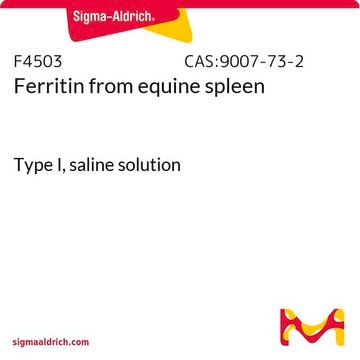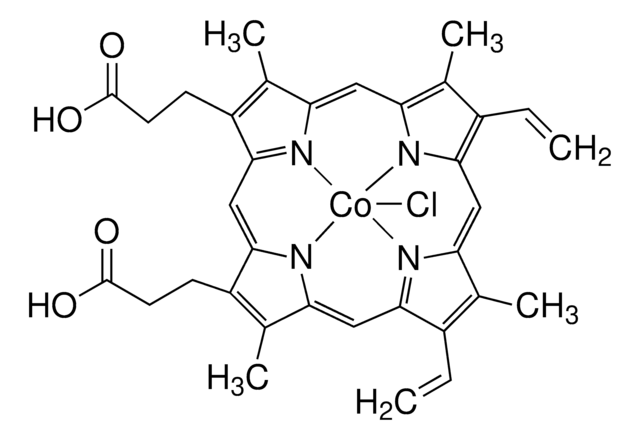C3021
Dicyanocobinamide
≥93%
Synonym(s):
Cobinamide dicyanide, Etiocobalamin, Factor B
About This Item
Recommended Products
biological source
synthetic (organic)
Quality Level
Assay
≥93%
form
powder
impurities
≤0.1% vitamin B12
color
purple to very dark purple
storage temp.
−20°C
SMILES string
N#C[Co]C#N.C[C@H](O)CNC(=O)CC[C@]1(C)[C@@H](CC(N)=O)C2N=C1C(C)=C3N=C(C=C4N=C(C(C)=C5N[C@]2(C)[C@@](C)(CC(N)=O)[C@@H]5CCC(N)=O)[C@@](C)(CC(N)=O)[C@@H]4CCC(N)=O)C(C)(C)[C@@H]3CCC(N)=O
InChI
1S/C48H73N11O8.2CN.Co/c1-23(60)22-55-38(67)16-17-45(6)29(18-35(52)64)43-48(9)47(8,21-37(54)66)28(12-15-34(51)63)40(59-48)25(3)42-46(7,20-36(53)65)26(10-13-32(49)61)30(56-42)19-31-44(4,5)27(11-14-33(50)62)39(57-31)24(2)41(45)58-43;2*1-2;/h19,23,26-29,43,59-60H,10-18,20-22H2,1-9H3,(H2,49,61)(H2,50,62)(H2,51,63)(H2,52,64)(H2,53,65)(H2,54,66)(H,55,67);;;/b30-19-,39-24-,40-25-;;;/t23-,26+,27+,28+,29-,43?,45+,46-,47-,48-;;;/m0.../s1
InChI key
NJATWHPHZUGTHR-GXEWULDJSA-N
Looking for similar products? Visit Product Comparison Guide
General description
Application
Biochem/physiol Actions
Certificates of Analysis (COA)
Search for Certificates of Analysis (COA) by entering the products Lot/Batch Number. Lot and Batch Numbers can be found on a product’s label following the words ‘Lot’ or ‘Batch’.
Already Own This Product?
Find documentation for the products that you have recently purchased in the Document Library.
Customers Also Viewed
Our team of scientists has experience in all areas of research including Life Science, Material Science, Chemical Synthesis, Chromatography, Analytical and many others.
Contact Technical Service













